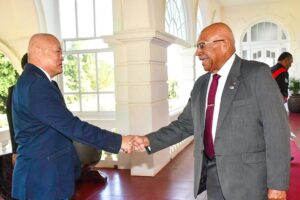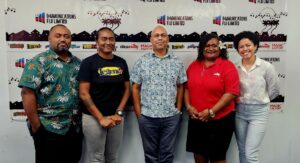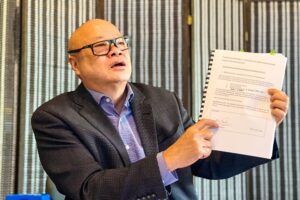Fiji’s former Attorney-General Graham Leung has accepted his dismissal by Prime Minister Sitiveni Rabuka, acknowledging the latter’s right to appoint and remove ministers, but warns that the fallout from a Commission of Inquiry report, which he labelled “a travesty of justice,” could damage public trust and institutional integrity.
Speaking to the press in Suva, Leung described his 11-month tenure as Fiji’s Attorney-General as a professional peak, expressing gratitude for the opportunity to serve.
“I’m very grateful to the Prime Minister of this country for having given me the opportunity to have served in his Cabinet, as his Attorney General, as he ought to be, for 11 months, and I look back at that period with a large measure of humility and gratitude.”
He described his appointment on 5 June 2024 as “the proudest day” of his professional career and the “culmination of 40 years of striving to be the best in my legal profession.”
Leung said he was abroad in Hong Kong attending a legal convention when he received news of his dismissal via text message at 4:50am local time — without prior consultation or explanation.
“Yes, I can confirm my [dismissal] by text message by five, I think at 10 to five in the morning in Hong Kong, which would have been about 10 to nine [Fiji time].”
“There was no prior communication between the Prime Minister and I on Malimali or the Commission.”
Though critical of the process, Leung said that he would not pursue legal action, acknowledging the Prime Minister’s constitutional authority.
“The Prime Minister of this country has the constitutional prerogative to recommend the appointment of ministers and the dismissal of ministers. That is not a decision that is open to legal challenge. I respect his constitutional prerogative, and that ship has sailed.
“It has never entered my contemplation that I would sue anybody for being dismissed. That’s not who I am anyway because I respect the fact that I lost the Prime Minister’s confidence, and he has every right to have done what he has done, whether you agree or not, that’s a different matter.”
While he accepted the dismissal, Leung warned about the inquiry’s wider effects on government and public perception. He warned that the handling of the report — including leaks, hearsay evidence, and the lack of natural justice — has begun to corrode internal trust within the public service.
“I think it’s caused a certain amount of suspicion and distrust. I think that’s a fair comment.
“The commission report, I believe, has extracted from many of us in this country… a personal cost in debasing our best instincts through what I would consider to be social media gossip… so that we no longer recognise the presumption of innocence as an important principle.”
Leung likened the atmosphere to earlier eras of authoritarian governance in Fiji, claiming that under previous administrations, the law was “used as a weapon to intimidate and silence.”
“The law was often used as a weapon to intimidate, to threaten, and even to silence individuals. Accusations would be made, and a presumption of guilt was often cast over people.”
“I’ve lived through all coups. I know how important and what the impacts are when the rule of law is broken or not followed, when people have their rights taken away from them.”
He also addressed the allegations against him raised in the report, which was officially released in redacted form by the government yesterday. The report alleged that Leung’s decision to advise the CJ to proceed with the appointment of FICAC Commissioner Barbara Malimali — despite knowing of the investigation against her — amounted to abuse of office, preventing the course of justice, conspiring to pervert the course of justice, and perjury.
Leung argued that his involvement in Malimali’s appointment was procedural, not decisive.
“So the JSC was required simply to consult me, Section Five doesn’t talk about seeking my approval or my concurrence or my agreement. All they needed to do was consult me. Which they did.”

He added that he merely signed a preformatted document already marked “consulted.”
“This document came to me in that form. The only thing that I put there was a signature and a date. I mean, you would hardly call that a ringing endorsement, would you?”
“Yet from that, someone has made a finding that I’ve committed a crime.”
“There was not a shred of evidence that I engaged in criminal conduct that would bring disrepute to my office at the time, my record, or indeed the institutions that I served.”
Leung called for a national recommitment to the rule of law, warning that the politicisation of the Commission’s findings could harm Fiji’s institutions well into the future.
“It’s not about me, it’s about us as a country — about the values we share and the principles we hold dear. Those are what must endure.”
Despite the high-stakes political fallout, Leung said he holds no bitterness over his dismissal and is looking ahead with optimism.
“I haven’t had a holiday in a year, so I’ll probably go do some fishing,” he said. “I’m starting to get work from the private sector, and I’m in a good space. There’s no recrimination, no anger, no bitterness. I’ve moved on.”
Related Articles:









